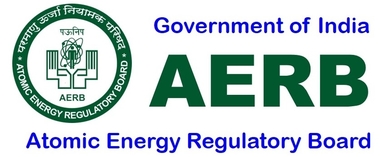Radiation Emergency in Nuclear Medicine and Preparedness
In nuclear medicine, large amounts of unsealed radionuclides are used for diagnosis of diseases and in the treatment of cancer and abnormalities. Any error, carelessness, absence/failure of safety facility/equipment, may lead to an accident or mishap. An accident is an unintended event or mishap, the consequences of which are not negligible from the radiation protection or safety point of view. It is an unplanned abnormal event leading to loss of control over the source of radiation with actual or potential consequences for person's safety and/or impact on the environment. Some of the examples of emergency situations that may arise in nuclear medicine department are:
- spillage of radio-pharmaceuticals,
- mis-administration of radio-pharmaceuticals to patient, and
- loss of sources in the department or in transit.
An accident in a nuclear medicine laboratory may cause personnel exposure, internal/external contamination or both. Hence it is essential that a sufficient level of emergency preparedness be ensured in the department. For this purpose, the licensee and RSO together should devise and implement an emergency response plan. Use of possible means, methods and facilities available in the department should prevent the accident. Observing simple and minor practices can prevent a number of accidents. Some of the practices and methods of prevention of accidents are mentioned in this text.
There are 2 other types of mishaps that can be envisaged in nuclear medicine and are beyond the control of the radiation worker. These are:
- Vomiting of radio-pharmaceutical by the patient,
- Death of a patient with administered radio-pharmaceuticals in the body.
While working with radio-pharmaceuticals, spillage can take place due to tilt of vial containing radio-pharmaceutical, leakage from the syringe or splash of liquid. Some time, vomiting of administered radio-pharmaceutical by the patient results in spread of radioactivity.
- Performing wet and dummy trials prior to handling the radio-pharmaceutical,
- Keeping vial containing the radio-pharmaceutical in an appropriate outer container with heavy base in order to avoid tilting of the vial,
- Performing all wet operations in a tray lined with polythene and absorbent paper so that the spilled radioactivity is contained and spread of contamination is restricted,
- Transporting the radio-pharmaceuticals within the lab in appropriate shielded transport containers,
- Preparation of doses in a careful manner by skilled person,
- Adopting standard code of practice in the preparation of dosages/radio- pharmaceuticals, and
- Ensuring stable condition of patient to avoid vomiting.
- Confine the spill immediately, by dropping paper towels or other absorbent material onto it.
- Evacuate the immediate area so that persons will not walk over the spill and spread the contamination.
- If the spilled material has splashed onto a person or clothing, immediate steps should be taken to remove the clothes and collect the same in a polythene bag and to be kept in the radioactive waste storage room. It should be ensured that the person with contaminated clothes does not leave the area before removing the protective clothing.
- Hands and other contaminated areas of the body should be washed thoroughly with soap and water. Care should be taken not to abrate or inflame the skin surface,
- Possible care must be taken to prevent intake of radioactive material. If intake of radioactive material has taken place, immediate action should be taken to prevent or minimise the deposition in organs or tissues. If necessary, steps should be taken to bring out the ingested radioactive material under the expert medical guidance,
- The internal deposition of radioactive material should be estimated by carrying out bioassay, whole body counting or both,
- Contaminated area should be decontaminated by expert team using appropriate methods, and
- The waste, collected during decontamination of the area, should be treated as radioactive waste and be disposed as per AERB safety guidelines.
Mis-administration of radio-pharmaceuticals
-
Types of mis-administration
-
- administration of radio-pharmaceutical to a wrong patient
- administration of wrong activity,
- administration of wrong radio-pharmaceuticals,
- administration through wrong route
- administration of radio-pharmaceutical in pregnant female patient without confirming the pregnancy.
-
Consequences of mis-administration
-
- non- justified exposure,
- increased radiation risks,
- delayed diagnosis,
- increase in cost,
- increase in workload
- reduction in confidence
- It is reported that about 80% of accidents are due to administration of wrong radio-pharmaceuticals, 10% by administration to wrong patient and about 2% by administration of wrong activity.
-
Causes of mis-administration
-
- communication problems or gaps,
- busy environment or distraction,
- bypassing local rules or code of practice,
- no training in emergency situations,
- absence of clearly defined responsibilities,
- absence of efficient quality assurance programme
-
Prevention of mis-administration
-
- using transparent vial and syringe shields,
- tagging,segregating the vials and syringes,
- write activity, source,patient on vial or syringe containing dosages,
- check labels of vial or syringes before administration,
- measuring the activity in radio-pharmaceutical,
- identifying name, no., case of the patient,
- ensuring that the female patient is not pregnant,
General methods of prevention of accidents
The accident of spillage and mis-administration can be avoided by preparing safe code of practice in the department, putting it in practice and educating the staff by the RSO in radiation safety of personnel, patient, members of public and the environment. Effort should be taken to inculcate safety culture in the department. The RSO should identify emergency situations and assess the causes and probabilities of occurring accidents in critical and normal situations in the department. Appropriate counter measures should be planned for each type of situation to avoid accidents. Any accident, happening in the department should be attended to immediately and reported to other staff members, head of the institution and AERB by the RSO. In addition, the following steps should also followed in general.
- There should be adequate number of trained staff available in the department to carry out the emergency plan,
- The personnel/staff should be instructed to exercise care in respective areas to avoid situations that may lead to an accident,
- All radiation monitoring, measuring instruments and safety devices should be routinely checked and kept in working condition. Handling equipment e.g. tongs, forceps, etc., should be kept in ready access,
- A proper inventory of radioisotopes received, used, in stock and disposed off should be maintained.
Emergency Response Team
Handling of emergency involves variety of actions and involvement of persons in different fields. Thus it is a teamwork. In many medical institutions, a team of experts, sometimes referred as the Emergency Response Committee, is formed. Each member of the team or committee is assigned specific responsibilities. These persons should be familiar with the workings in the institution so that co-ordination among them can be assured. The Emergency Response Committee should consist of the following officials:
- Authorised nuclear medicine physician
- Physicist
- Laboratory assistant
- Radiation Safety Officer (RSO)
- Administrative personnel
- Electronic instrumentation expert
- Emergency Director
The Committee should discuss the problem periodically to avoid recurrence of accidents.







